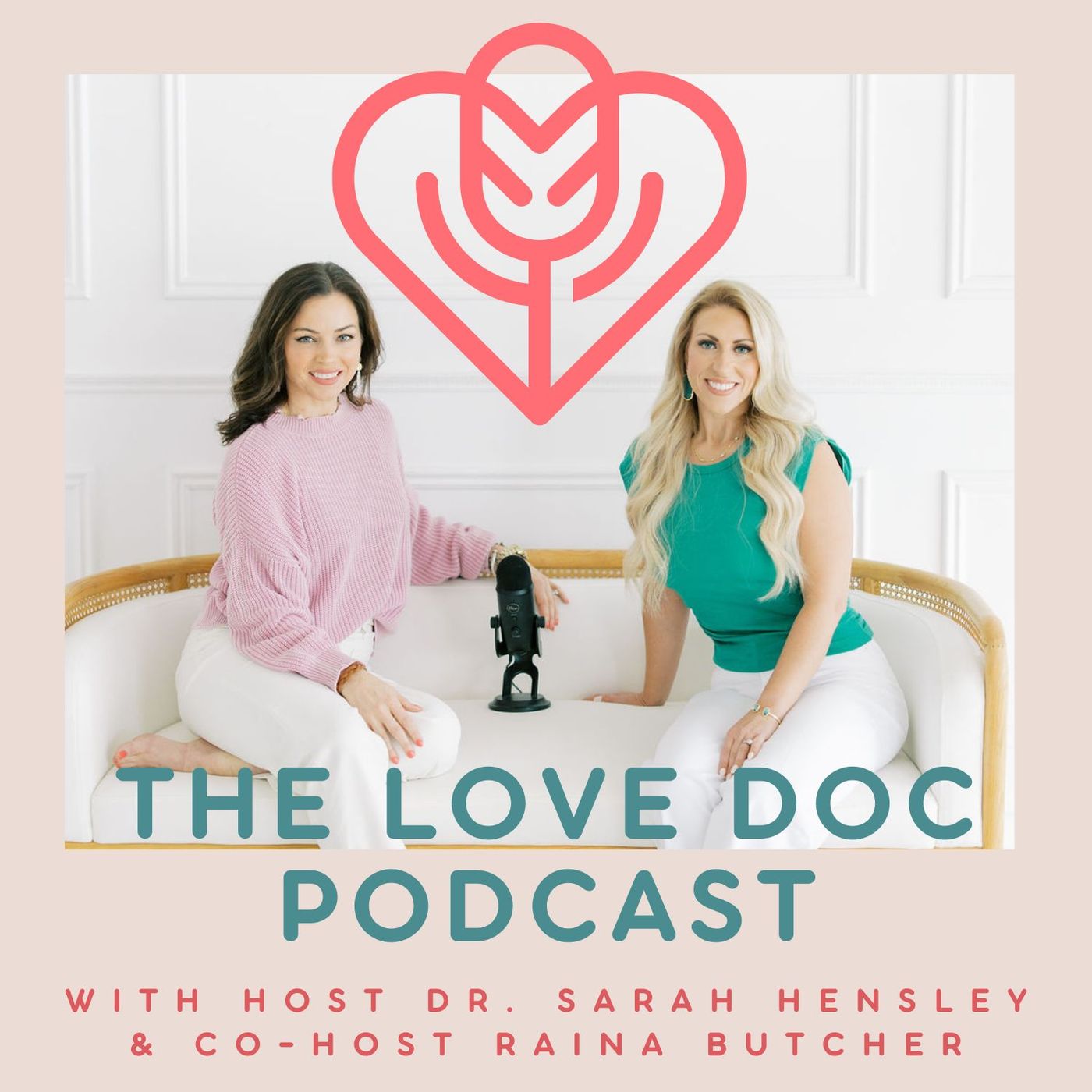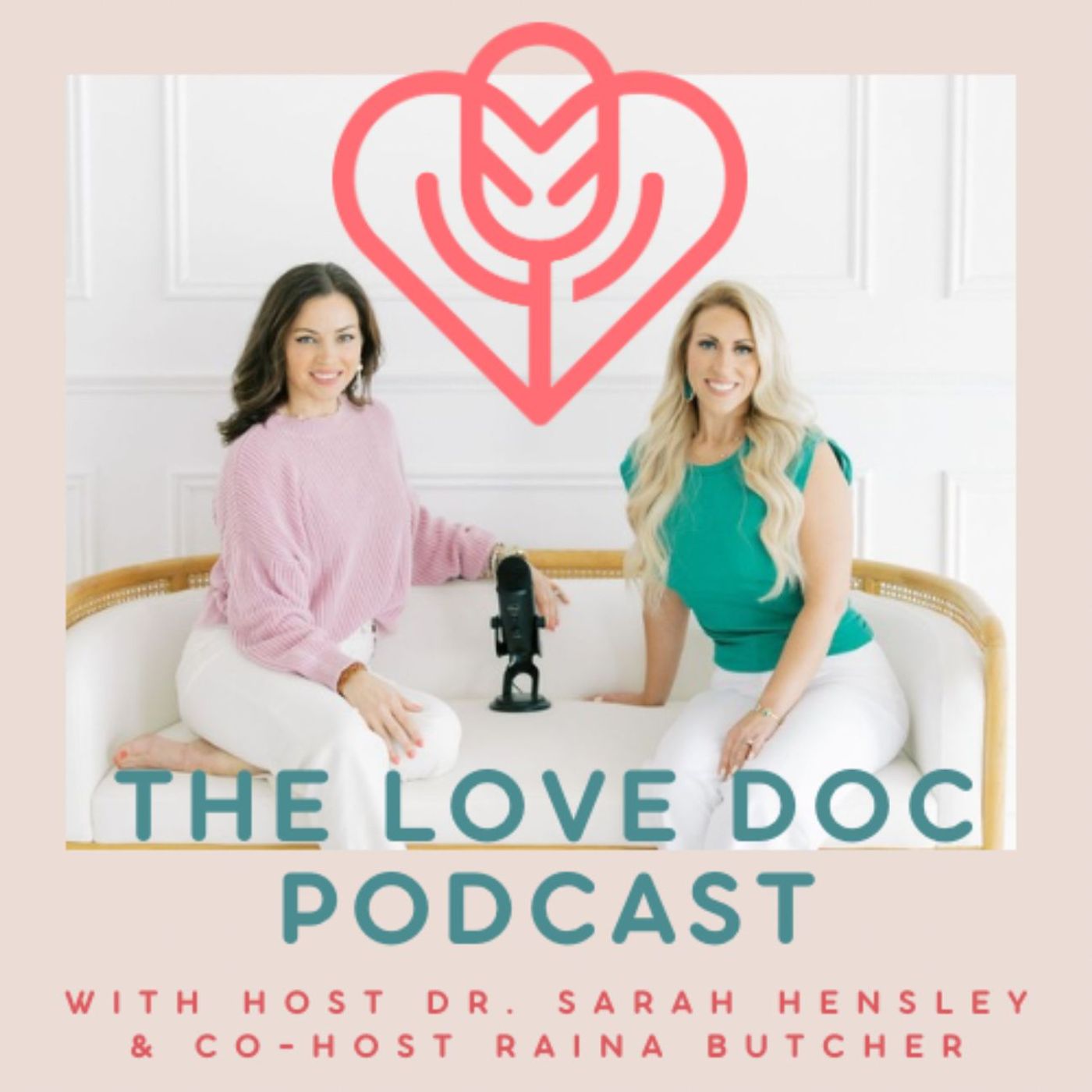Episode 25 | It's a Capacity Issue
Update: 2024-11-05
Description
Hosted by Dr. Sarah Hensley, Specialized Social Psychologist, Attachment Theory Expert, and Founder & CEO of The Dating Decoder with Co-host Raina Butcher, Owner/CEO of Joyful Consulting.
Welcome to "The Love Doc Podcast" where Host Dr. Sarah Hensley and her co-host Raina Butcher dive deep into the intricacies of love, attraction, attachment, relationships, and self-awareness. Dr. Hensley brings a wealth of knowledge and experience to help listeners navigate the complexities of modern romance. In each episode, Dr. Hensley tackles burning questions about love, relationships, and the mind’s complexities, drawing from her psychological research, real-life experiences, and her own individual expertise, to provide insightful perspectives and practical advice.
In episode 25: “It’s a Capacity Issue,” Dr. Hensley takes listeners on an in-depth journey into the concept of building capacity, emphasizing that true change and healing require more than just awareness and understanding. She explains that building capacity is about bridging the gap between intellectual understanding and actionable change, which requires specific mediators between the pathways of knowledge and behavior.
Dr. Hensley begins by discussing the psychoeducation she provides in her group coaching programs to help participants develop this capacity. She underscores that awareness alone doesn’t create transformation; instead, certain mental and emotional tools are essential to support lasting change. One of the first components she covers is self-regulation, which she describes as the ability to bring the nervous system to a place of safety. This can be challenging, she notes, particularly for those carrying attachment wounds from childhood, which shape their responses in adulthood.
Using the dismissive avoidant (DA) attachment style as a key example, Dr. Hensley delves into how attachment wounds are formed and how those with DA tendencies can build capacity for change. She discusses how early experiences of suppression and dismissal impact the DA’s brain, leading them to default to a freeze response during conflict. This response reflects the limits of their nervous system’s capacity at that moment, which, though protective, often cuts off connection to their partner.
At the midpoint of the episode, Dr. Hensley introduces the tools she provides in her hybrid group coaching program, highlighting metacognition as a crucial skill. She teaches clients to recognize and dismantle their trigger cycles, tracing the journey from trigger to trauma response. By giving the nervous system new, healthier experiences, clients can begin to build new neural pathways that reinforce these changes, helping them gradually shift their patterns.
Dr. Hensley explains the science of neuroplasticity, emphasizing that everyone has the power to rewire their brains and reshape their behavior. However, she reminds listeners that the journey from awareness to actual change requires specific guidance and support.
In the episode’s conclusion, Dr. Hensley explores the concept of radical self-acceptance. She encourages listeners to meet themselves where they are to start creating a sense of safety within their nervous system, which is foundational to building capacity. She also shares more about her coaching services, explaining how each program can support individuals or couples in their journey of growth, healing, and connection.
Tune in to "The Love Doc Podcast" every Tuesday morning for candid conversations, expert guidance, and a deeper understanding of love and relationships in the modern world. To see all of Dr. Hensley’s services please visit the links below and follow her on social media.
Dr. Hensley’s Hybrid Group Coaching: https://www.thedatingdecoder.com/group-coaching/
Book one on one with Dr. Hensley or one of her certified coaches: https://www.thedatingdecoder.com/book-appointment/
Purchase Dr. Hensley’s online course: https://dating-decoder.mykajabi.com/offers/PpEPKnsM/checkout
Tik-Tok: the_dating_decoder
Instagram: @the_dating_decoder
Facebook: The Dating Decoder
Youtube: @Dr.SarahHensley
What is covered:
. What it means to build capacity.
·The difference in having awareness and knowledge versus true integration of changed behavior.
·The psychoeducation taught in Dr. Hensley's group services.
·Self regulation and what it means.
.The example of the Dismissive Avoidant and how they can start to build capacity.
.Metacognition and what it means.
Consider/Ask Yourself:
· Is your nervous system ready to start building capacity?
. Have you had time to process your wounds, build awarness and knowlege around them so that you can start to change the behavior associated with them?
. Are you practicing self regulation practices when triggered?
. How can I start recognizing my triggers and the trauma responses associated with them?
. How can I start attuning to my basic human needs and practicing radical self acceptance so that my nervous system can feel safe and I can start building better capcity for change?
Become a supporter of this podcast: https://www.spreaker.com/podcast/the-love-doc-podcast--6390558/support.
Welcome to "The Love Doc Podcast" where Host Dr. Sarah Hensley and her co-host Raina Butcher dive deep into the intricacies of love, attraction, attachment, relationships, and self-awareness. Dr. Hensley brings a wealth of knowledge and experience to help listeners navigate the complexities of modern romance. In each episode, Dr. Hensley tackles burning questions about love, relationships, and the mind’s complexities, drawing from her psychological research, real-life experiences, and her own individual expertise, to provide insightful perspectives and practical advice.
In episode 25: “It’s a Capacity Issue,” Dr. Hensley takes listeners on an in-depth journey into the concept of building capacity, emphasizing that true change and healing require more than just awareness and understanding. She explains that building capacity is about bridging the gap between intellectual understanding and actionable change, which requires specific mediators between the pathways of knowledge and behavior.
Dr. Hensley begins by discussing the psychoeducation she provides in her group coaching programs to help participants develop this capacity. She underscores that awareness alone doesn’t create transformation; instead, certain mental and emotional tools are essential to support lasting change. One of the first components she covers is self-regulation, which she describes as the ability to bring the nervous system to a place of safety. This can be challenging, she notes, particularly for those carrying attachment wounds from childhood, which shape their responses in adulthood.
Using the dismissive avoidant (DA) attachment style as a key example, Dr. Hensley delves into how attachment wounds are formed and how those with DA tendencies can build capacity for change. She discusses how early experiences of suppression and dismissal impact the DA’s brain, leading them to default to a freeze response during conflict. This response reflects the limits of their nervous system’s capacity at that moment, which, though protective, often cuts off connection to their partner.
At the midpoint of the episode, Dr. Hensley introduces the tools she provides in her hybrid group coaching program, highlighting metacognition as a crucial skill. She teaches clients to recognize and dismantle their trigger cycles, tracing the journey from trigger to trauma response. By giving the nervous system new, healthier experiences, clients can begin to build new neural pathways that reinforce these changes, helping them gradually shift their patterns.
Dr. Hensley explains the science of neuroplasticity, emphasizing that everyone has the power to rewire their brains and reshape their behavior. However, she reminds listeners that the journey from awareness to actual change requires specific guidance and support.
In the episode’s conclusion, Dr. Hensley explores the concept of radical self-acceptance. She encourages listeners to meet themselves where they are to start creating a sense of safety within their nervous system, which is foundational to building capacity. She also shares more about her coaching services, explaining how each program can support individuals or couples in their journey of growth, healing, and connection.
Tune in to "The Love Doc Podcast" every Tuesday morning for candid conversations, expert guidance, and a deeper understanding of love and relationships in the modern world. To see all of Dr. Hensley’s services please visit the links below and follow her on social media.
Dr. Hensley’s Hybrid Group Coaching: https://www.thedatingdecoder.com/group-coaching/
Book one on one with Dr. Hensley or one of her certified coaches: https://www.thedatingdecoder.com/book-appointment/
Purchase Dr. Hensley’s online course: https://dating-decoder.mykajabi.com/offers/PpEPKnsM/checkout
Tik-Tok: the_dating_decoder
Instagram: @the_dating_decoder
Facebook: The Dating Decoder
Youtube: @Dr.SarahHensley
What is covered:
. What it means to build capacity.
·The difference in having awareness and knowledge versus true integration of changed behavior.
·The psychoeducation taught in Dr. Hensley's group services.
·Self regulation and what it means.
.The example of the Dismissive Avoidant and how they can start to build capacity.
.Metacognition and what it means.
Consider/Ask Yourself:
· Is your nervous system ready to start building capacity?
. Have you had time to process your wounds, build awarness and knowlege around them so that you can start to change the behavior associated with them?
. Are you practicing self regulation practices when triggered?
. How can I start recognizing my triggers and the trauma responses associated with them?
. How can I start attuning to my basic human needs and practicing radical self acceptance so that my nervous system can feel safe and I can start building better capcity for change?
Become a supporter of this podcast: https://www.spreaker.com/podcast/the-love-doc-podcast--6390558/support.
Comments
Top Podcasts
The Best New Comedy Podcast Right Now – June 2024The Best News Podcast Right Now – June 2024The Best New Business Podcast Right Now – June 2024The Best New Sports Podcast Right Now – June 2024The Best New True Crime Podcast Right Now – June 2024The Best New Joe Rogan Experience Podcast Right Now – June 20The Best New Dan Bongino Show Podcast Right Now – June 20The Best New Mark Levin Podcast – June 2024
In Channel






